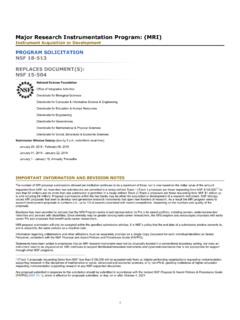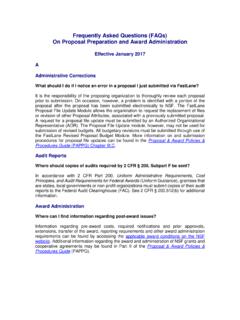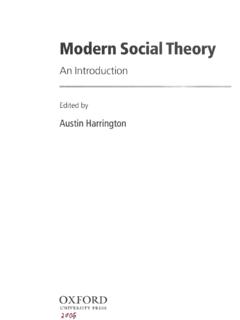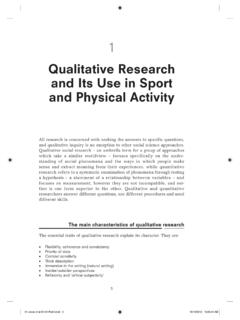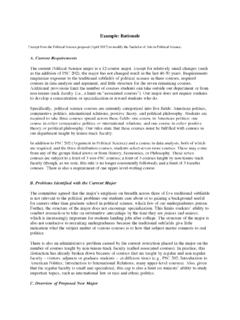Transcription of Science, Technology, and Society (STS)
1 Science, technology , and Society (STS)PROGRAM SOLICITATION NSF 15-506 REPLACES DOCUMENT(S):NSF 12-509 National Science FoundationDirectorate for social , Behavioral & Economic sciences Division of social and Economic SciencesFull Proposal Deadline(s) (due by 5 submitter's local time): February 02, 2015 February 2, Annually Thereafter August 03, 2015 August 3, Annually ThereafterIMPORTANT INFORMATION AND REVISION NOTESI ndividual Postdoctoral fellowship proposals are no longer being accepted by the Science, technology , and Society (STS) program. All social , Behavioraland Economic sciences (SBE) individual Postdoctoral Fellowship proposals should be submitted to the SBE Postdoctoral research Fellowship Program(SPRF). Visit the SPRF program website for additional information concerning the SPRF solicitation revises the characterization of the program to emphasize that it studies the full range of scientific, technological, engineering, andmathematical (STEM) disciplines, including medical science, using historical, philosophical, and social scientific approaches; and that it focuseson the intellectual, material, and social facets of STEM.
2 The solicitation being replaced emphasized the interface between science and Awards and Postdoctoral Fellowships are distinguished as separate modes of funding; they were previously combined into one caps set on specific budget items (such as those on undergraduate, graduate, and post-doctoral research assistants) have been caps on the award are now stated in terms of direct costs rather than the total costs, which included indirect costs; for most modes offunding, the designated cap effectively increases the cap on total costs indicated in the old Dissertation research Improvement Grant proposals now only have one deadline per year, August 3, and they are submitted to theSTS program only under this proposal submitted in response to this solicitation should be submitted in accordance with the revised NSF Proposal & Award Policies & ProceduresGuide (PAPPG) (NSF 19-1), which is effective for proposals submitted, or due, on or after February 25, OF PROGRAM REQUIREMENTSG eneral InformationProgram Title:Science, technology , and Society (STS)Synopsis of Program:The Science, technology , and Society (STS) program supports research that uses historical, philosophical, and social scientificmethods to investigate the intellectual, material, and social facets of the scientific, technological, engineering and mathematical (STEM)disciplines.
3 It encompasses a broad spectrum of STS topics including interdisciplinary studies of ethics, equity, governance, and policyissues that are closely related to STEM disciplines, including medical program s review process is approximately six months. It includes appraisal of proposals by ad hoc reviewers selected for their1 This document has been archived and replaced by NSF and by an advisory panel that meets twice a year. The deadlines for the submission of proposals are February 2nd forproposals to be funded as early as July, and August 3rd for proposals to be funded in or after January. There is one exception: DoctoralDissertation Improvement Grant proposals will have only one deadline per year, August Program encourages potential investigators with questions as to whether their proposal fits the goals of the program to contact oneof the program Program Officer(s) and Additional Points of Contact:Frederick Kronz-Program Director, Program Officer, telephone: (703) 292-7283, email: Parker-Program Director, telephone: (703) 292-5034, email: Catalog of Federal Domestic Assistance (CFDA) Number(s) --- social Behavioral and Economic SciencesAward InformationAnticipated Type of Award: Standard Grant or Continuing GrantEstimated Number of Awards: 40 Anticipated Funding Amount: $6,200,000 Approximately $6,200,000 will be made available in FY 2015 to support an estimated 40 awards.
4 Estimated program budget and number of awards aresubject to the availability of InformationWho May Submit Proposals:Proposals may only be submitted by the following:Organization limit varies by the mode of support:Standard research Grants and Grants for Collaborative research : US Academic Institutions and Non-ProfitResearch Awards: US Academic Institutions and Independent Dissertation research Improvement Grants: US Academic and Workshop Support: No limitations. See NSF's Proposals and Awards Policies and Procedures Guide(PAPPG), Chapter I, Section E for categories of proposers eligible to submit proposals to Section II. Program Description for detailed information about each mode of May Serve as PI:PI eligibility limit varies by the mode of support. See Section II. Program Description for detailed information about each mode on Number of Proposals per Organization:There are no restrictions or on Number of Proposals per PI or Co-PI:There are no restrictions or Preparation and Submission InstructionsA.
5 Proposal Preparation InstructionsLetters of Intent: Not requiredPreliminary Proposal Submission: Not requiredFull Proposals:Full Proposals submitted via FastLane: NSF Proposal and Award Policies and Procedures Guide (PAPPG) guidelines apply. Thecomplete text of the PAPPG is available electronically on the NSF website at: Proposals submitted via : NSF Proposal and Award Policies and Procedures Guide (PAPPG) guidelines apply. Thecomplete text of the PAPPG is available electronically on the NSF website at: Proposals submitted via : NSF Application Guide: A Guide for the Preparation and Submission of NSF2 Applications via guidelines apply (Note: The NSF Application Guide is available on the website andon the NSF website at: ).B. Budgetary InformationCost Sharing Requirements:Inclusion of voluntary committed cost sharing is Cost (F&A) Limitations:Not ApplicableOther Budgetary Limitations:Other budgetary limitations apply. Please see the full text of this solicitation for further Due DatesFull Proposal Deadline(s) (due by 5 submitter's local time): February 02, 2015 February 2, Annually Thereafter August 03, 2015 August 3, Annually ThereafterProposal Review Information CriteriaMerit Review Criteria:National Science Board approved criteria Administration InformationAward Conditions:Additional award conditions apply.
6 Please see the full text of this solicitation for further Requirements:Standard NSF reporting requirements OF CONTENTSS ummary of Program RequirementsI. IntroductionII. Program DescriptionIII. Award InformationIV. Eligibility InformationV. Proposal Preparation and Submission InstructionsA. Proposal Preparation InstructionsB. Budgetary InformationC. Due DatesD. RequirementsVI. NSF Proposal Processing and Review ProceduresA. Merit Review Principles and CriteriaB. Review and Selection ProcessVII. Award Administration InformationA. Notification of the AwardB. Award ConditionsC. Reporting Requirements3 VIII. Agency ContactsIX. Other InformationI. INTRODUCTIONS cience, technology , and Society (STS) is an interdisciplinary field that investigates topics relating to the scientific, technological, engineering andmathematical (STEM) disciplines, including medical science. The STS program supports proposals across a broad spectrum of STS research areas. STSresearch uses historical, philosophical, and social scientific methods to investigate STEM theory and practice, and it may be empirical or , it may focus on the intellectual, material, or social facets of STEM including interdisciplinary studies of ethics, equity, governance, and PROGRAM DESCRIPTIONSTS is an interdisciplinary field that investigates topics relating to the scientific, technological, engineering and mathematical (STEM) disciplines, includingmedical science.
7 STS research uses historical, philosophical, and social scientific methods to investigate STEM theory and practice with regards tohistory and socio-cultural formation, philosophical underpinnings, and impacts of science and technology on quality of life, culture, and Society . STSresearchers strive to understand how STEM fields contribute to the development and use of systems of knowledge, the production and use of materialsand devices, the co-evolution of socio-technical systems and their governance, and the place of science and technology in the modern research focuses on the intellectual, material, and social facets of STEM. Such research endeavors to understand how scientific knowledge isproduced and sanctioned, and how it is challenged and changes. It explores broader societal ramifications and underlying presuppositions. STS researchstudies how materials, devices, and techniques are designed and developed; how and by whom they are diffused, used, adapted, and rejected; how theyare affected by social and cultural environments; and how they influence quality of life, culture, and Society .
8 STS research explores how socio-culturalvalues are embedded in science and technology , and how issues of governance and equity co-evolve with the development and use of scientificknowledge and technological researchers make use of methods from a variety of disciplines, including anthropology, communication studies, history, philosophy, political Science, and sociology. STS research includes interdisciplinary studies of ethics, equity, governance, and policy issues. STS studies may be empirical STS program supports proposals across the broad spectrum of STS research areas, topics, and approaches. Examples include, but are by nomeans limited to:1. Societal aspects of emerging high-tech technologies ( , nanotechnology, synthetic biology, neuroscience, robotics, drones, ubiquitouscomputing, crowd sourcing, remote-sensing)2. Societal aspects of emerging low-tech technologies ( , paper microscopes; whirlwind wheel chairs)3. Issues relating to equity, ethics, governance, sustainability, public engagement, user-centeredness, and Integration of traditional STS approaches with innovative perspectives from the arts or Ethical, policy, and cultural issues regarding big data, surveillance and privacy in an increasingly networked world, and6.
9 The science of broadening participation in STEM addition, the STS program is particularly interested in proposals that will contribute to NSF's research -focused Big Ideas:Harnessing the Data Revolution for 21st Century Science and EngineeringNavigating the New ArcticThe Quantum Leap: Leading the Next Quantum RevolutionWork at the Human- technology Frontier: Shaping the FutureUnderstanding the Rules of Life: Predicting PhenotypeWindows on the Universe: The Era of Multi-Messenger AstrophysicsEffective STS proposals will clearly present the research questions, describe and explain the suitability of the methods to be used to address thosequestions, and provide a detailed work plan with a timeline that demonstrates adequate resources and access to any required data. If the plan involvesresearch at archives, working in specific labs, or engaging with pertinent community groups, it is important to provide evidence of access and to indicatethe specific questions to be asked or addressed.
10 If the plan involves surveys, the proposal should discuss sample selection and survey design andcontent. Similar advice pertains for other modes of STS research involving focus groups, ethnographies, modeling, conceptual analysis, and so proposals suitably situate the proposed project in pertinent STS literatures, issues, and conceptual or theoretical frameworks, and articulate howthe results of the proposed project would serve to advance STS, or subfields , successful proposals make a strong case for broader impacts. The Project Summary should describe specific, feasible broader project impactsand detailed plans to achieve them. A work plan for maximizing potential broader impacts and dissemination of results to multiple audiences includingstakeholders and the public should be included in the Project Description. PIs are encouraged to engage in new modes of disseminating results broadly,not just to academics, but to stakeholders and the general OF SUPPORTThe STS program supports several distinct modes of funding in order to accommodate the diverse research needs of the STS community.
